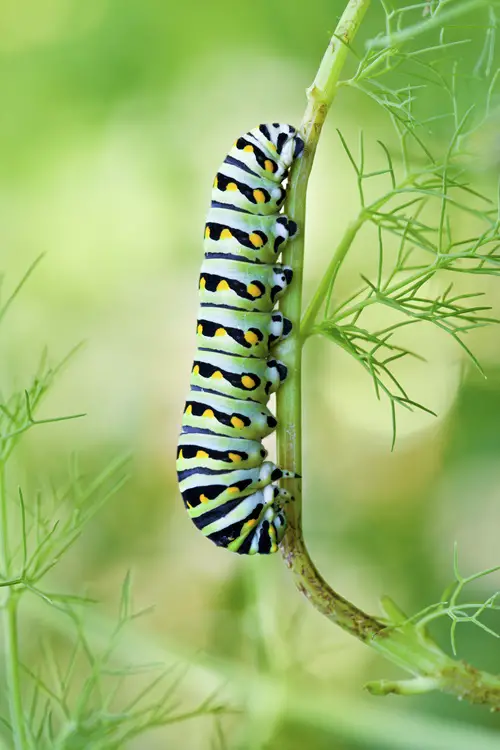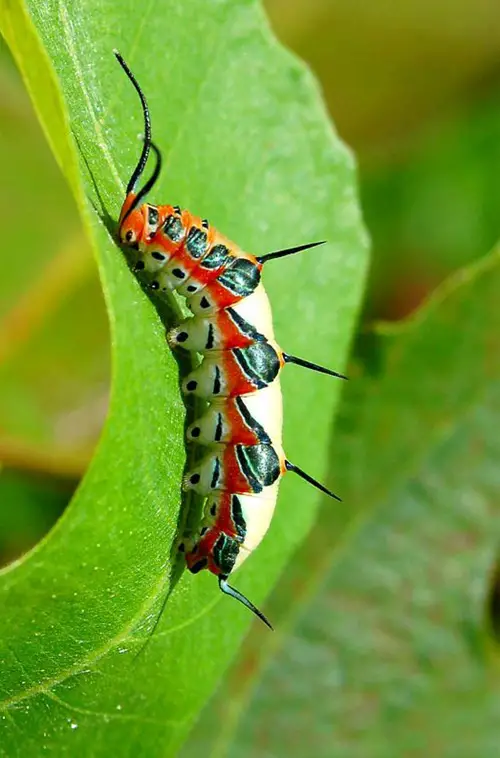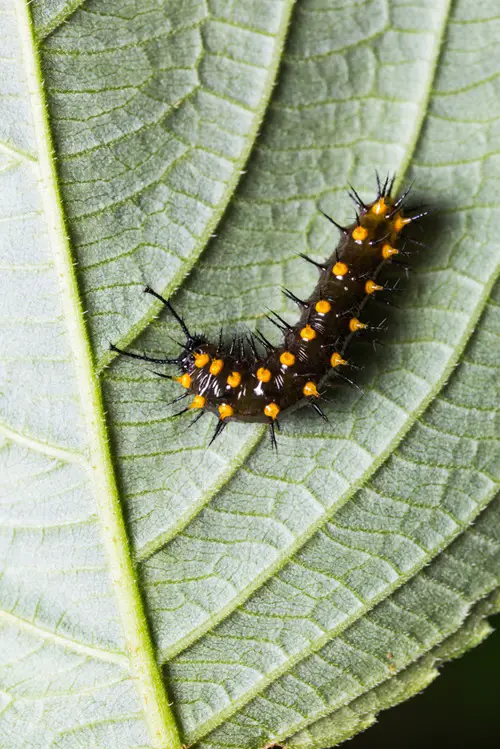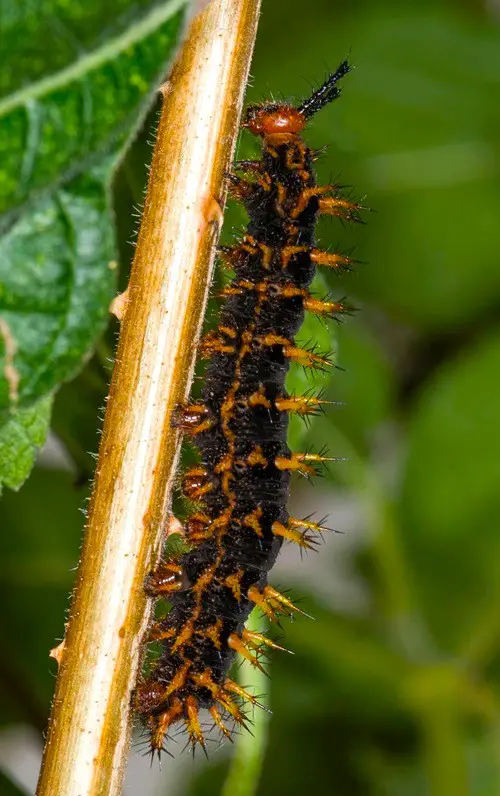Orange and Black Caterpillars – though not so common, they do stand out with their stunning color combination!
As harbingers of stunning butterflies and moths, these colorful Orange and Black Caterpillars not only capture the eye but also serve as intriguing subjects of ecological importance. Get ready to delve into the fascinating patterns they exude!
Orange and Black Caterpillars
1. Gulf Fritillary Caterpillar
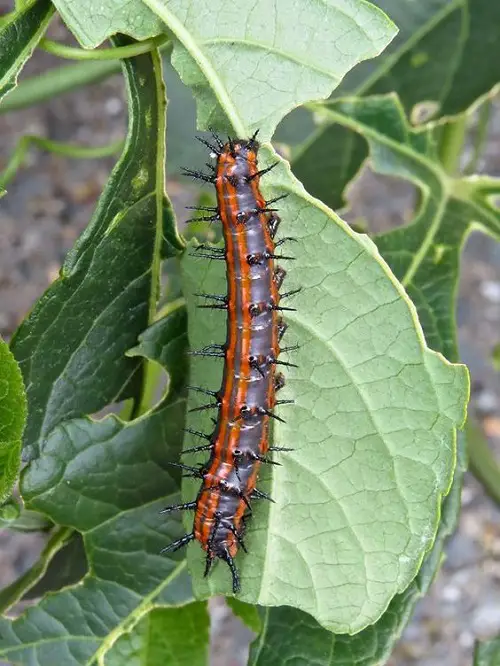
Scientific Name: Agraulis vanillae
These orange and black caterpillars boast a striking appearance with brilliant orange body covered in black spines. Its larval stage lasts for approximately 2-3 weeks, during which it feeds on the leaves of passionflowers.
2. Painted Lady Caterpillar
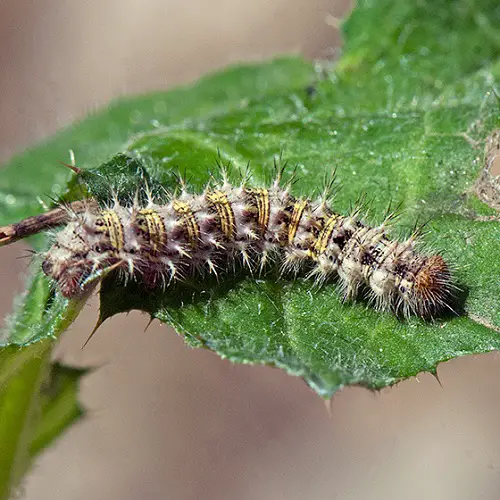
Scientific Name: Vanessa cardui
Its larva features distinct black and orange stripes, accompanied by tiny spines. Their lifespan typically ranges from 2 to 4 weeks.
3. Black Swallowtail Caterpillar
Scientific Name: Papilio polyxenes
Native to North America, the Black Swallowtail caterpillar showcases an attractive contrast with its black body adorned by vivid orange spots and stripes. As larvae, they thrive for 2-4 weeks, consuming the leaves of parsley, dill, and fennel.
4. Question Mark Caterpillar
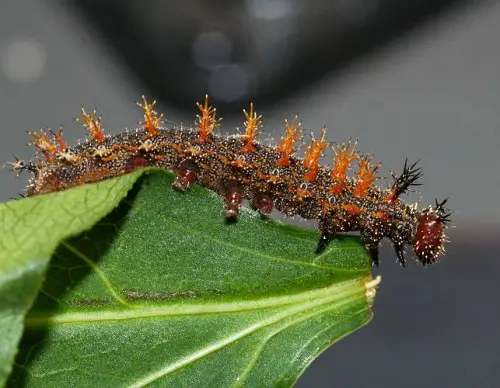
Scientific Name: Polygonia interrogationis
Native to North America, these orange and black caterpillars derive their name from the distinctive silver shape resembling a question mark on its hindwings. Their larval stage spans approximately 2-3 weeks, and they feed on various host plants.
5. Common Buckeye Caterpillar

Scientific Name: Junonia coenia
The Common Buckeye caterpillar showcases an eye-catching appearance with black and orange bands on its body. Their larval phase lasts for about 2-3 weeks, and they predominantly feed on plantain and snapdragon leaves.
6. Pipevine Swallowtail Caterpillar
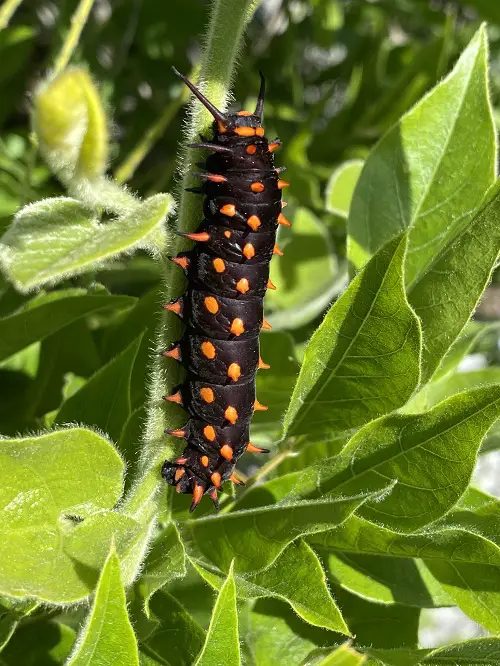
Scientific Name: Battus philenor
These orange and black caterpillars stand out by their velvety black body having orange spots and spines. Their larval stage lasts for about 2-4 weeks, and they primarily feed on pipevine plants.
7. Variegated Fritillary Caterpillar
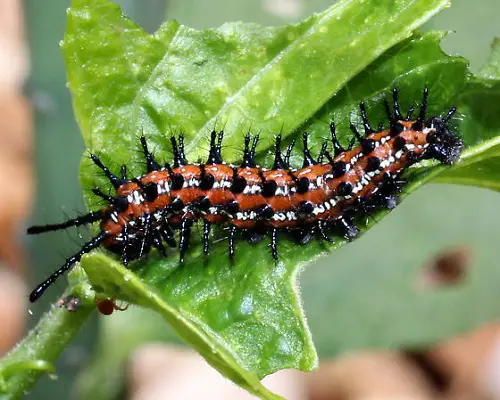
Scientific Name: Euptoieta claudia
Native to North and South America, it features a mix of orange and black patterns on its body. Their larval stage typically lasts for 2-4 weeks, and they primarily feed on violets.
8. Bordered Patch Caterpillar

Scientific Name: Chlosyne lacinia
These orange and black caterpillars showcase a distinctive appearance with black and orange markings. Their larval lifespan is around 2-4 weeks, and they primarily feed on sunflowers and asters.
9. Great Spangled Fritillary Caterpillar

Scientific Name: Speyeria cybele
Native to North America, it features a striking orange body with black spines and spots. Their larval stage typically lasts for 2-4 weeks.
10. Ruddy Daggerwing Caterpillar
Scientific Name: Marpesia petreus
These orange and black caterpillars have a unique appearance with reddish-orange coloration and black markings. Their larval phase extends for about 2-4 weeks, and they primarily feed on fig leaves.
11. Varied Eggfly Caterpillar

Scientific Name: Hypolimnas bolina
Native to Asia and the Pacific Islands, these orange and black caterpillars feature a combination of orange and black patterns. Their larval lifespan is around 2-4 weeks, and they primarily feed on passionflower vines.
12. Orange Oakleaf Caterpillar
Scientific Name: Kallima inachus
Orange Oakleaf caterpillar mimics a dead leaf with its intricate orange and black markings. Their larval stage typically extends for 2-3 weeks, and they primarily feed on the leaves of the Mast tree.
13. Danaid Eggfly Caterpillar
Scientific Name: Hypolimnas misippus
The Danaid Eggfly caterpillar features a bright orange body with black spots and stripes. Their larval stage lasts for about 2-4 weeks, and they primarily feed on passionflower vines.
14. Redhumped Moth Caterpillar
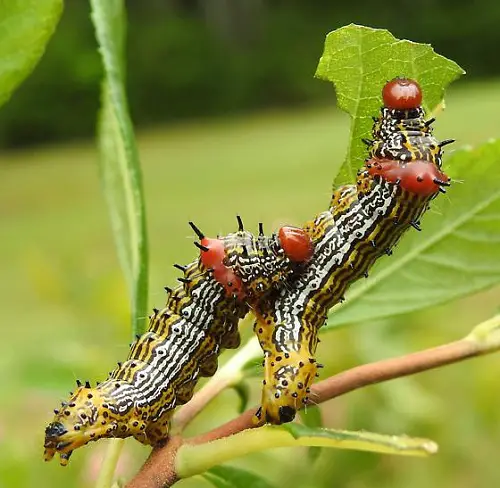
Scientific Name: Schizura concinna
These orange and black caterpillars can be easily identified by its green body and prominent reddish “hump” on its back. Its lifespan varies with environmental factors.
15. Cinnabar Moth Caterpillar
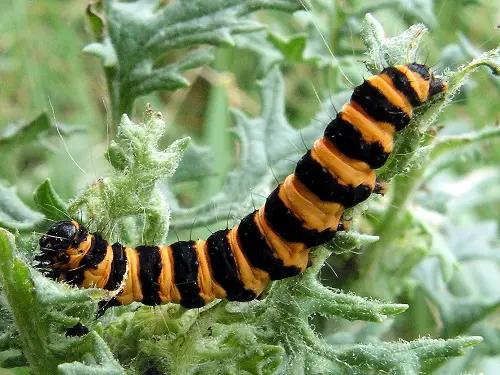
Scientific Name: Tyria jacobaeae
The Cinnabar Moth Caterpillar looks striking with its black and orange stripes. They feed on toxic ragwort plants, storing toxins for self-defense.
16. Yellow-Tail Moth Caterpillar
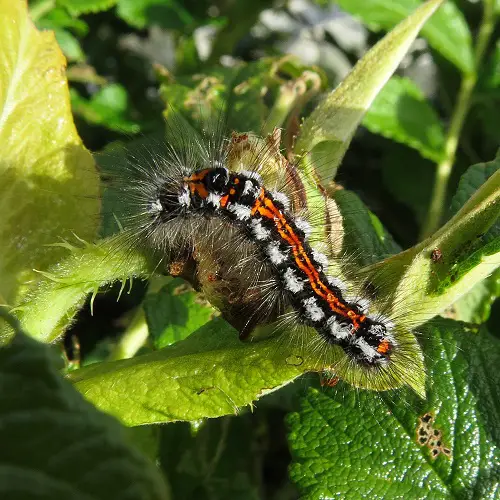
Scientific Name: Euproctis similis
These orange and black caterpillars feature a white-hairy body and a distinctive yellow tail. Native to Europe and Asia, they feed on trees and shrubs like oaks and willows.
17. Isabella Tiger Moth Caterpillar
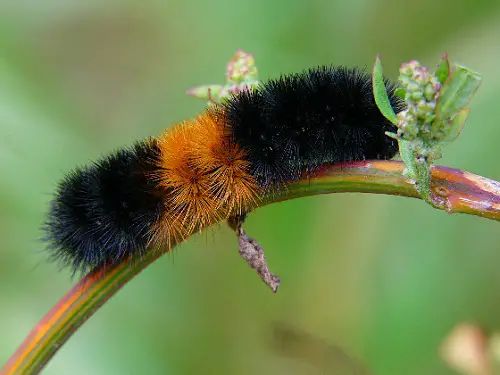
Scientific Name: Pyrrharctia isabella
This orange-black caterpillar feeds on various plants and spends several weeks in the larval stage. You can find them in a range of habitats, including fields, gardens, and woodlands.
18. Fox Moth Caterpillar
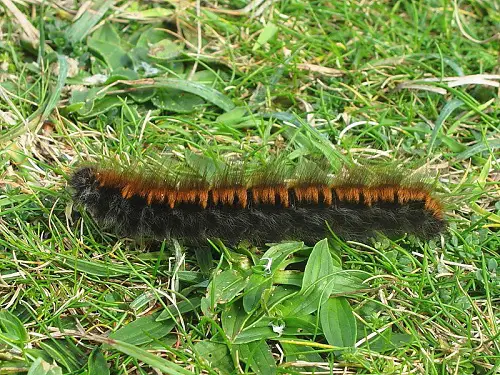
Scientific Name: Macrothylacia rubi
These orange and black caterpillars primarily feed on heather and bilberry leaves and are typically found in heathlands, moorlands, and woodland clearings.
19. Oleander Caterpillar
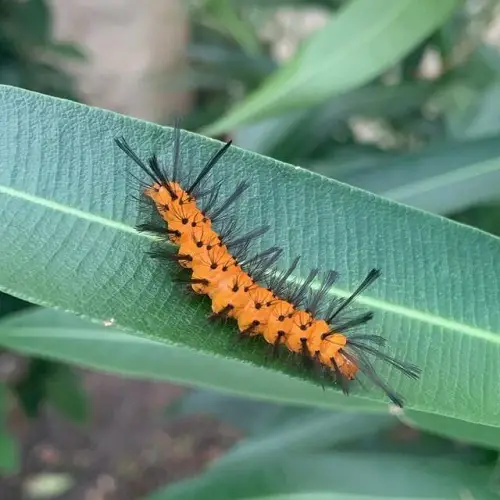
Scientific Name: Syntomeida epilais
These caterpillars stand out with their bright orange body and contrasting black spots and stripes. Oleander Caterpillars are common in southeastern United States.
20. Cape Lappet Moth Caterpillar
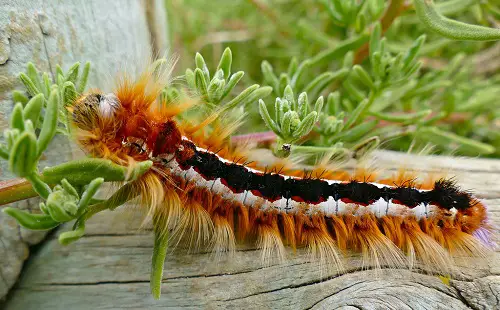
Scientific Name: Eutricha capensis
The Cape Lappet Moth Caterpillar has a distinctive appearance with a velvety black body adorned with orange or yellow spots and tufts of white or yellowish bristles.
21. Mourning Cloak Caterpillar

Scientific Name: Nymphalis antiopa
These caterpillars have a dark brown to black body with orange spines and white specks. They primarily feed on various host plants such as willows and elms.
22. Spurge Hawk-moth Caterpillar
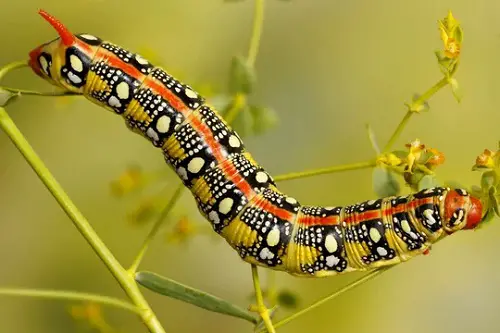
Scientific Name: Hyles euphorbiae
These orange and black caterpillars have a vibrant green body with diagonal stripes of white, black, and orange along their sides.
23. Malachite Caterpillar

Scientific Name: Siproeta stelenes
These caterpillars primarily feed on various host plants, including members of the Acanthaceae family. They are commonly in tropical and subtropical regions.
24. Spiny Elm Caterpillar

Scientific Name: Nymphalis antiopa
These caterpillars have dark brown to black body adorned with orange spines and white specks. They primarily feed on willows and elms.
25. Silvery Checkerspot Caterpillar

Scientific Name: Chlosyne nycteis
Silvery Checkerspots have a black body with rows of orange spots along their back and a silvery-white pattern.
26. Western Sheep Moth Caterpillar
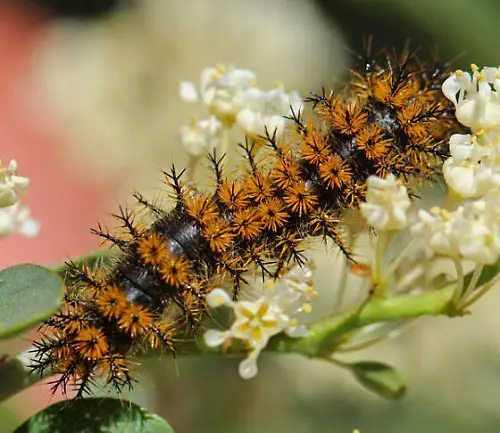
Scientific Name: Hemileuca eglanterina
Western Sheep Moth Caterpillars have a dark brown to black body adorned with white or pale yellow stripes and bands.
27. Large Gray Dagger Caterpillar
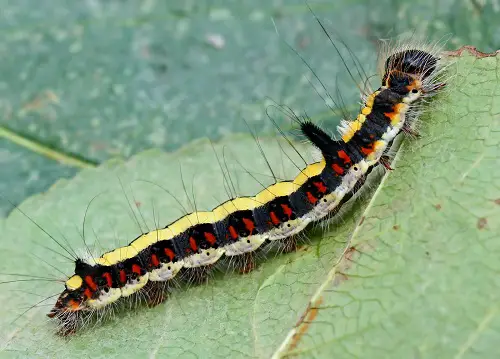
Scientific Name: Acronicta psi
Native to Europe, they have a yellow band on a orange and black pattern skin. During their larval stage, they go through several molts before pupating.
28. Sonoran Tent Caterpillar

Scientific Name: Malacosoma constrictum
These caterpillars primarily feed on a variety of desert shrubs and deciduous trees. They have a hairy appearance with a prominent grey band.
29. Baltimore Checkerspot Caterpillar

Scientific Name: Euphydryas phaeton
Baltimore Checkerspot Caterpillars feature a black body adorned with distinctive rows of orange and white spots and bristles.
30. Eastern Tent Caterpillar

Scientific Name: Malacosoma americanum
Eastern Tent Caterpillars primarily feed on the leaves of deciduous trees, including cherry and apple trees. They have a faint orange top line on a black body.
31. Orange-Tipped Oakworm

Scientific Name: Anisota senatoria
Orange-tipped oakworms have a brown body with rows of orange or yellow spots along their sides and a prominent orange tip at the rear.
32. Cactus Moth Caterpillar

Scientific Name: Cactoblastis cactorum
These caterpillars are invasive in some regions, particularly North America, where they feed primarily on various cactus species.


